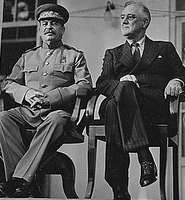I'm going to start by looking at a myth I find quite common among any discussion of the Democrats - the myth of the good old days. Apparently there was some time in the past where Democrats were better than they are today, where they stood for something. I just don't buy it, and so I'm going to have a quick jaunt through the history of recent recent Democrat US Presidents in an effort to find out when this golden age could have occured.Oddly, she only goes back as far as the duplicitous FDR in her investigation of a political history that today's left liberal could be proud of -- I guess she does say "recent Democrat US Presidents" - but at least she gives the old dissembler a richly deserved slagging, before concluding that there's nothing in recent Democratic history for a left liberal to enthuse over.
That's an odd approach to take.
 There's nothing much in recent US Presidents of either persuasion for a libertarian to enthuse over, but you might have thought FDR's NRA, New Deal and enormous expansion of both government and government waste would have been enough to sway Maia's left liberal enthusiasm. Nope. Maybe he didn't grow government enough for her? Her summary of the man who would be king: "It's not just the many things he didn't do that make Roosevelt a bad president. He was the man who ordered that Japanese-Americans be rounded up and put into camps." And of course he did do that, amongst very many other things -- like for example delivering half of post-war Europe and much of post-war Asia into communism. Not something I think for which even Maia would venerate somebody.
There's nothing much in recent US Presidents of either persuasion for a libertarian to enthuse over, but you might have thought FDR's NRA, New Deal and enormous expansion of both government and government waste would have been enough to sway Maia's left liberal enthusiasm. Nope. Maybe he didn't grow government enough for her? Her summary of the man who would be king: "It's not just the many things he didn't do that make Roosevelt a bad president. He was the man who ordered that Japanese-Americans be rounded up and put into camps." And of course he did do that, amongst very many other things -- like for example delivering half of post-war Europe and much of post-war Asia into communism. Not something I think for which even Maia would venerate somebody.But if you're looking for a Democratic golden age, why not go further back. Look perhaps at Woodrow Wilson, the Democrat who took America into the First World War "to make the world safe for democracy" after promising American voters he wouldn't (a feat repeated by FDR in World War II) and whose treaty-mongering at the subsequent Peace Conference did much to bring on the next World War; or at old Andy Jackson, whose opposition to central baning and Indian-killing exploits are maybe considered just a little outré even by today's Democrats; or James Buchanan, who won in 1856 by opposing measures that would have stopped the extension of slave-holding to border states, and was elected only by the majority afforced him by Democrat-voting pro-slavery states.
Ah, those were the days. The good old golden days of the Democrats.
But there were at least two god Democrats, to my mind. One of the good guys was Grover Cleveland, a committed classical liberal who opposed the dispensing of political favours, who stood against protective tariffs and entangling alliances, and who once told a group of importuning Texan farmers after welfare from the Federal treasury to "Federal aid in such cases encourages the expectation of paternal care on the part of the Government and weakens the sturdiness of our national character..." There's a Democrat after whom the party could model itself.
 Or of course there is the 'original Democrat' to whom both JFK and FDR paid lip service, and after whom the most recent Democratic President William Jefferson Clinton was named. If today's Democrats could find inspiration from Thomas Jefferson, president from 1800 to 1808 under the Democrat-Republican ticket (as the Democratic party was then called), the US and the world would be a better place. That really was a golden age for politics. Jefferson's presidential platform on which he ran in 1800, as summed up in a letter to a friend, went like this:
Or of course there is the 'original Democrat' to whom both JFK and FDR paid lip service, and after whom the most recent Democratic President William Jefferson Clinton was named. If today's Democrats could find inspiration from Thomas Jefferson, president from 1800 to 1808 under the Democrat-Republican ticket (as the Democratic party was then called), the US and the world would be a better place. That really was a golden age for politics. Jefferson's presidential platform on which he ran in 1800, as summed up in a letter to a friend, went like this:I shall make to you a profession of my political faith; in confidence that you will consider every future imputation on me of a contrary complexion, as bearing on its front the mark of falsehood and calumny.If Maia's looking for Democratic inspiration, then she should look past the political pygmies of this century and the one just past to giants such as this. That's a political platform for any age. The shame of it is that both Democrat and Republican presidents have done their best to undermine almost every part of such a platform. As a libertarian, that's just one reason I generally hold both those parties in contempt.
I do then, with sincere zeal, wish an inviolable preservation of our present federal constitution, according to the true sense in which it was adopted by the States, that in which it was advocated by its friends, and not that which its enemies apprehended, who therefore became its enemies; and I am opposed to the monarchising its features by the forms of its administration, with a view to conciliate a first transition to a President and Senate for life, and from that to a hereditary tenure of these offices, and thus to worm out the elective principle.
I am for preserving to the States the powers not yielded by them to the Union, and to the legislature of the Union its constitutional share in the division of powers. And I am not for transferring all the powers of the States to the general government, nor all those of that government to the Executive branch.
I am for a government rigorously frugal and simple, applying all the possible savings of the public revenue to the discharge of the national debt; and not for a multiplication of officers and salaries merely to make partisans, and for increasing, by every device, the public debt, on the principle of it's being a public blessing.
I am for relying, for internal defence, on our militia solely, till actual invasion, and for such a naval force only as may protect our coasts and harbors from such depredations as we have experienced; and not for a standing army in time of peace, which may overawe the public sentiment; nor for a navy, which, by its own expenses and the eternal wars in which it will implicate us, grind us with public burthens, and sink us under them.
I am for free commerce with all nations, political connection with none, and little or no diplomatic establishment. And I am not for linking ourselves by new treaties with the quarrels of Europe; entering that field of slaughter to preserve their balance, or joining in the confederacy of kings to war against the principles of liberty.
I am for freedom of religion, and against all maneuvers to bring about a legal ascendancy of one sect over another: for freedom of the press, and against all violations of the constitution to silence by force and not by reason the complaints or criticisms, just or unjust, of our citizens against the conduct of their agents.
LINKS: I don't understand why anyone cares about the Democrats - Capitalism Bad, Tree Pretty
Thomas Jefferson: Letter to Elbridge Gerry - Positive Atheism
TAGS: Politics-US, History

1 comment:
Men of great wisdom are seldom listened to any more.
Now, it is people promoting a cause that have the attention of the sheeple.
The rule of thumb is that the perceived value of the cause is inversely proportional to the number of people it will actually help.
Post a Comment